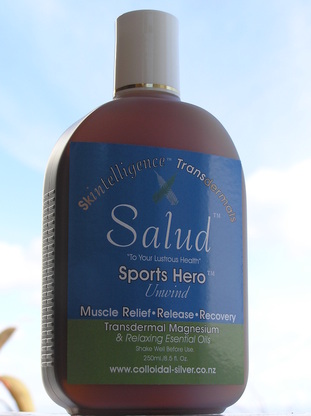Why do athletes have a critical need for magnesium?
Studies show that an imbalance in magnesium can significantly reduce your performance levels. Are you neglecting this important electrolyte?
Studies show that an imbalance in magnesium can significantly reduce your performance levels. Are you neglecting this important electrolyte?
Questions to ask yourself:
- Do you constantly battle muscle cramps during intense or long training?
- Does muscular weakness prevent you from putting forth full effort?
- Do asthmatic symptoms prevent you from completing workouts?
- Does it feel as if your heart skips a beat, causing feelings of light headedness and dizziness?
- Does muscular weakness prevent you from putting forth full effort?
- Do asthmatic symptoms prevent you from completing workouts?
- Does it feel as if your heart skips a beat, causing feelings of light headedness and dizziness?
- Have you recently found yourself feeling tired during your workouts, with longer recovery times than you used to require?
- Do you suffer from post exercise migraines, or insomnia?
- Are physical returns from an intensive strength training program less than anticipated?
If you answered yes to any of these questions, you may be suffering from a magnesium deficiency and consequent hindered endurance performance.
There is emerging evidence that magnesium requirements are significantly elevated in athletes. Strenuous exercise increases urinary and sweat losses that may increase magnesium requirements by 10-20%.
Magnesium deficiency is actually quite common -dietary surveys indicate more than 70 percent of the population consumes insufficient magnesium. Unfortunately, magnesium is not a mineral that is replaced in our soils, making it often impossible to obtain the necessary amounts of magnesium from the food we eat.
- Do you suffer from post exercise migraines, or insomnia?
- Are physical returns from an intensive strength training program less than anticipated?
If you answered yes to any of these questions, you may be suffering from a magnesium deficiency and consequent hindered endurance performance.
There is emerging evidence that magnesium requirements are significantly elevated in athletes. Strenuous exercise increases urinary and sweat losses that may increase magnesium requirements by 10-20%.
Magnesium deficiency is actually quite common -dietary surveys indicate more than 70 percent of the population consumes insufficient magnesium. Unfortunately, magnesium is not a mineral that is replaced in our soils, making it often impossible to obtain the necessary amounts of magnesium from the food we eat.
What does magnesium do?
Magnesium is required by virtually every cell, and it’s vital in more than 300 chemical processes that sustain basic human health and function, including muscle contraction and relaxation, nerve function, cardiac activity, blood pressure regulation, immunity, bone health and synthesis of hormones, proteins, fats and nucleic acids.
Magnesium is also crucial for energy metabolism by the activation of enzymes known as ATPases, which are needed to generate ATP (adenosine triphosphate). When ATP is broken down, energy is released for all muscle contractions, and when exercising strenuously, this turnover is extremely high, meaning that ATP needs to be synthesized quickly. Thus a shortfall of magnesium can limit energy production, leading to fatigue, lethargy, reduced power, muscle twitches or cramps.
Chronic deficiencies of magnesium are also implicated in reduced bone mineral density and increased risk of osteoporosis as well as anemia, depression and irregular heart rate.
No serious athlete or trainer can afford to overlook the benefit that magnesium brings to athletic performance and the recovery process. Research suggests that even a small shortfall in magnesium can lead to greatly reduced performance and stamina.
Many athletic medical specialists believe that magnesium is the single most important mineral for sports nutrition. Not only does it help optimise an athlete’s performance but it speeds up recovery from fatigue and injuries.
The good news is that improvements can be seen very quickly with transdermal Magnesium, helping redirect your performance back to your peak.
Magnesium is also crucial for energy metabolism by the activation of enzymes known as ATPases, which are needed to generate ATP (adenosine triphosphate). When ATP is broken down, energy is released for all muscle contractions, and when exercising strenuously, this turnover is extremely high, meaning that ATP needs to be synthesized quickly. Thus a shortfall of magnesium can limit energy production, leading to fatigue, lethargy, reduced power, muscle twitches or cramps.
Chronic deficiencies of magnesium are also implicated in reduced bone mineral density and increased risk of osteoporosis as well as anemia, depression and irregular heart rate.
No serious athlete or trainer can afford to overlook the benefit that magnesium brings to athletic performance and the recovery process. Research suggests that even a small shortfall in magnesium can lead to greatly reduced performance and stamina.
Many athletic medical specialists believe that magnesium is the single most important mineral for sports nutrition. Not only does it help optimise an athlete’s performance but it speeds up recovery from fatigue and injuries.
The good news is that improvements can be seen very quickly with transdermal Magnesium, helping redirect your performance back to your peak.
The Superior Qualities of Transdermal Magnesium
Transdermal preparations are the new wave in effective, uniform and safe absorption through the pores of the skin.
- People vary greatly in their ability to utilize typical oral formulations yet they generally absorb minerals quickly and effectively through the pores, especially the soles of the feet.
- A significant advantage is a perfectly tailored dosage for every individual at the particular point in time of ingestion, since the body ceases to absorb natural substances through the skin when optimal internal levels have been reached.
- All factors considered, transdermal preparations are the simplest, most direct, safest and most cost-effective mineral supplementation available today.
- People vary greatly in their ability to utilize typical oral formulations yet they generally absorb minerals quickly and effectively through the pores, especially the soles of the feet.
- A significant advantage is a perfectly tailored dosage for every individual at the particular point in time of ingestion, since the body ceases to absorb natural substances through the skin when optimal internal levels have been reached.
- All factors considered, transdermal preparations are the simplest, most direct, safest and most cost-effective mineral supplementation available today.


 RSS Feed
RSS Feed
